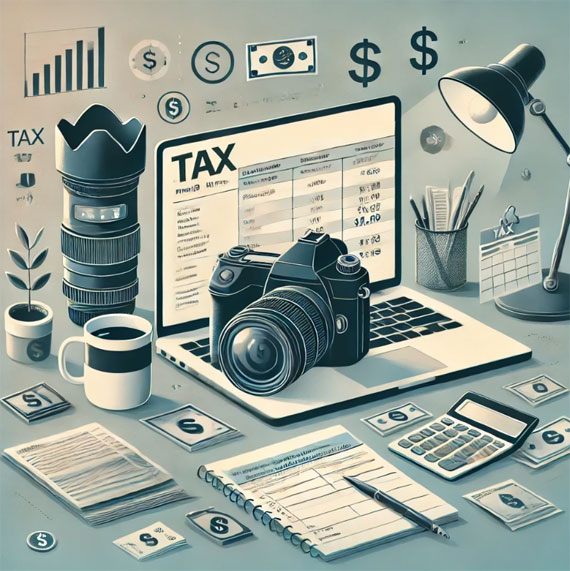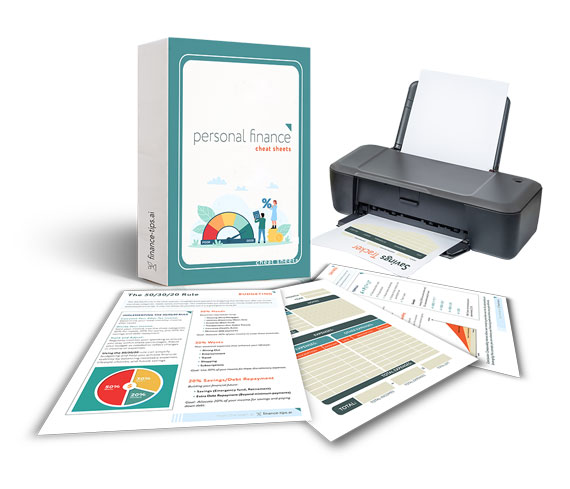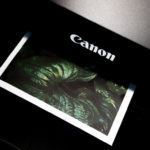Tax season can be stressful for anyone, but it’s especially challenging for photographers juggling gear, editing software, travel, and more. The good news? Many of your professional expenses may be deductible, helping to reduce your tax burden and keep more cash in your pocket. In today’s article, we’ll explore common tax deductions and write-offs specifically relevant to photographers, along with a few strategies for staying organized year-round.
Also thanks to our new friends at finance-tips.ai, who helped us put together these valuable insights!

First—Who Can Claim These Deductions?
If you earn income as a photographer, you may qualify to deduct ordinary and necessary business expenses. This generally applies whether you’re:
A Sole Proprietor
If you haven’t formed a formal entity (like an LLC or corporation) but still earn income through your photography, you can typically file your photography income and expenses on your personal tax return (Schedule C in the U.S.).
A Single-Member LLC or Other Small Business Entity
Forming a limited liability company (LLC) or S corporation can offer certain legal protections and tax advantages, but it’s not a requirement to claim business-related deductions. However, some structures may help you separate personal and business finances more cleanly.
Regardless of your structure, the key requirement is that the expense is both ordinary (common in the photography industry) and necessary (helpful or required for running your photography business). Always keep meticulous records of what you spend and how it relates to your work.
1. Camera Equipment & Accessories
From your DSLR or mirrorless camera body and lenses to tripods, memory cards, and camera bags, essential gear directly related to your photography business is often deductible. Keep clear documentation of your purchases:
- Receipts & Dates: Note the purchase date and cost, whether bought new or used.
- Proper Classification: If an item is used partly for personal reasons, only the business percentage is deductible.
Pro Tip: If you’re replacing multiple pieces of major equipment in one year, consult your tax professional to determine whether to deduct the full cost in the current tax year or depreciate it over multiple years—both approaches can have different tax implications.
2. Editing Software & Subscriptions
Most photographers rely on software for post-processing, album design, or organizational tasks. These include:
- Subscriptions: Adobe Creative Cloud, Capture One, or other editing tools
- Apps & Online Services: Portfolio hosting platforms, cloud storage (Dropbox, Google Drive), etc.
- Photo Editing Presets/Plugins: Purchased for business use
Maintain separate records of these ongoing costs to simplify your bookkeeping. As with gear, only the portion used for business is deductible if you also use these tools personally.
3. Home Office Deduction
If you work from home, you may be eligible for a home office deduction. This applies if:
- You have a dedicated area exclusively used for business (e.g., a room for editing photos and meeting clients).
- It’s the principal place of your photography operations (where most work and admin happen).
You can deduct a portion of expenses like rent, mortgage interest, utilities, and internet based on the percentage of your home’s total square footage that’s dedicated to business use. This deduction can apply whether you’re a sole proprietor or have formed an LLC—what matters is proper documentation and exclusive business use of that space.
4. Website & Marketing Costs
Your website is your digital storefront, and promoting your services is essential for growth. Potential deductions include:
- Domain & Hosting Fees
- Website Design & Maintenance
- Social Media Advertisements
- Printed Marketing Materials (business cards, brochures)
Keep detailed records of your marketing expenditures, as these costs can quickly add up over the course of a year.
5. Travel & Mileage
Photographers often travel for location shoots, weddings, or client meetings. If the travel is strictly business-related, these costs can be deductible:
- Mileage or Transportation Costs: Keep a log of business-related miles driven or track ride-share costs (Uber, Lyft, taxi).
- Lodging & Meals (with limits): If you travel out of town for a shoot, reasonable hotel and meal expenses may also be deductible.
Make sure you’re separating personal travel from business trips—mixed-use vacations often require nuanced documentation for partial deductions.
6. Insurance & Memberships
Many photographers carry:
- Equipment Insurance: Protects against theft, damage, or loss.
- Liability Insurance: Covers accidents or lawsuits related to your business.
- Professional Organization Fees: Such as memberships in PPA (Professional Photographers of America) or local photography guilds.
These are typically considered ordinary and necessary expenses for your photography business, so they can be written off. Be sure to save policy paperwork and membership invoices.
7. Educational Expenses
Continued learning is vital in such a fast-evolving field. Online courses, seminars, and workshops geared toward improving your photography skills or running your business can be deductible. Just ensure the course content directly applies to your photography business goals.
8. Keeping Accurate Records
One of the best ways to ensure you’re claiming the right deductions—and not missing any—is to stay organized throughout the year:
- Use Accounting Software: Tools like QuickBooks, FreshBooks, or Wave can automatically track and categorize expenses.
- Separate Bank Accounts: Keep personal and business finances separate, making it easier to pull up relevant transactions.
- Save Your Receipts: Digital or paper, make sure you keep them all. Many apps allow you to snap photos of receipts and store them directly.
9. Consult a Professional
Tax laws can change, and each photographer’s situation is unique. What works for a wedding photographer may differ from a stock photographer. Talk to a qualified tax professional or accountant familiar with creative freelancers. They can guide you on:
- Optimal Business Structure (sole proprietor, LLC, S corp) for your specific needs
- Depreciation Schedules for expensive gear
- State & Local Taxes that may affect your write-offs
By understanding and leveraging available deductions, photographers can lighten their tax load and put more resources into growing their craft. Whether you’re a part-time hobbyist making side income or a full-time pro, keep precise records and consult experts when in doubt.
Here’s to a smoother tax season—and more time spent doing what you love: capturing stunning images!
For Further Help:
Did you know that personal finance is the #1 topic students wish they had learned more about in school? Whether you’re just starting your financial journey or navigating retirement, these new Personal Finance Cheat Sheets are here to guide you every step of the way.
They are designed for quick reference, so you can easily access the information you’re looking for in seconds. Plus, their printable format means you can have a physical copy at your fingertips anytime.
Found here: Personal Finance Cheat Sheets Launch Sale
Like This Article?
Don't Miss The Next One!
Join over 100,000 photographers of all experience levels who receive our free photography tips and articles to stay current:







Leave a Reply